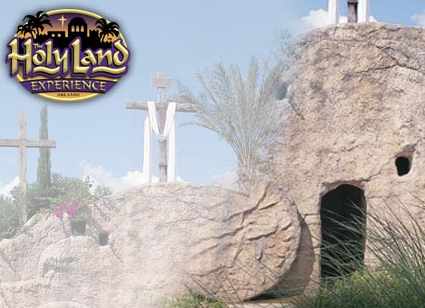This, according to the Kansas City Star:
The crucifixion was canceled.
The announcement came over loudspeakers as fat clouds formed above a replica of Christ’s garden tomb. Dozens of disappointed tourists and pilgrims who came to witness the spectacle – a daily event at the Holy Land Experience, a 15-acre, $16 million biblical theme park tucked off Interstate 4 in Orlando – trudged toward the exit.
The musical reenactment of Christ’s death and resurrection, delivered daily by one of the park’s three Jesus impersonators, helps draw an average of 250,000 people a year to Holy Land.
All this and more for $30 per person. Courtesy of the property-tax exemption Jeb Bush granted to “nonprofit organizations that display biblical manuscripts or that stage scenes from the Bible.” Scenes like this:

For those who think I’m making this up, check out the web site for the Holy Land Theme Park:
The Holy Land Experience brings together the sights and sounds of the world of the Bible in a unique and interactive way unlike anywhere else.
It is a living, biblical museum that takes you 7000 miles away and 2000 years back in time to the land of the Bible. Its combination of sights, sounds, and tastes will stimulate your senses and blend together to create a spectacular new experience.
But above all, beyond the fun and excitement, we hope that you will see God and His Word exalted and that you will be encouraged in your search for enduring truth and the ultimate meaning of life.


Oh my goodness! I simply have no words. I had no idea!
Seems to me the "Holy Land" theme park is just like any other for-profit theme park, just with religious-themed murals and characters. Why should a theme park become tax-exempt merely because its target market is Christians as opposed to, say, people interested in Disney characters (Disneyland) or marine animals (Busch Gardens)? Does this mean that if Disneyland slaps up a poster of the Ten Commandments or builds a "Holy Lands" display at Epcot Center, they would instantly become a tax-exempt entity? More to the point: if Fundamentalist Christians are correct to call secular humanism a "religion," then would all secular businesses (fast food restaurants, dry cleaners, bookstores, etc.) then become tax-exempt, too, because they are "promoting" the "religion" of secularism?